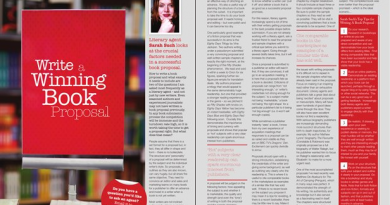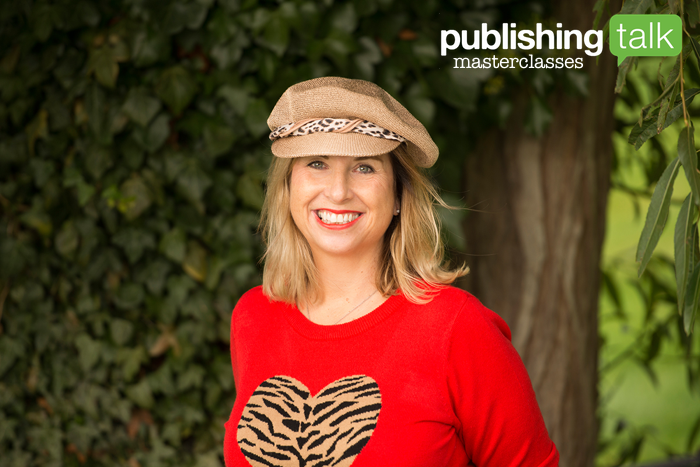How a digital platform helped re-launch science fiction novel The Red Men
When science fiction novel The Red Men was first written, ebooks and video sharing were futuristic tools. Now, as reality catches up with fiction, author Matthew De Abaitua shares his path to publication and tells Publishing Talk how a digital platform is bringing it to a wider audience.
Dr. Easy, a short film by Shynola about a robot medic, is based on chapter one of The Red Men by Matthew De Abaitua. It stars Tom Hollander and had over 100,000 views in the first week of its release on Vimeo.
Cynics say that publishing a novel is like dropping a feather into the Grand Canyon. When I started out, I believed that good work would find its way in the end. Now I know it takes good work and something more.
My first novel The Red Men was published in 2007. I had spent six years planning, writing and re-writing The Red Men, trying to find a way to combine the point of view of literary fiction with the ideas and plotting of science fiction. To me, the future had arrived and I wanted to write a novel which expressed the terrifying quality of future shock that came with the first decade of the new century; a time of terrorist spectaculars, fear mongering, deluded economics, advanced technology and backward management.
I have no commercial nous. I have the kind of mind that rears away from common knowledge. If a million people are reading Dan Brown, then I am spared the trouble.
This approach has not made life easy for me.
 When it came to placing the book with an agent, I had already spent my twenties publishing short stories so I had a modest rep, a rep which cut no ice with the first few agents I approached. The Red Men aren’t very likeable characters, said one agent: no, I replied, they are deranged digital simulations of executives. And there the conversation ended.
When it came to placing the book with an agent, I had already spent my twenties publishing short stories so I had a modest rep, a rep which cut no ice with the first few agents I approached. The Red Men aren’t very likeable characters, said one agent: no, I replied, they are deranged digital simulations of executives. And there the conversation ended.
I was fortunate to catch the eye of Sarah Such, who was just starting up her own agency. She was ‘very taken’ with The Red Men. But first, she explained, the manuscript would need some work. For starters, it wasn’t called The Red Men; it was called Leave My Soul Alone. ‘Of course the title has to be changed,’ said Sarah. ‘And you should cut the swearing out. And you need a new opening that cues readers into what type of book this is.’ Over the next six months, I made the changes that Sarah requested and more.
The manuscript of The Red Men was acquired by James Bridle, who was then working at Snowbooks. James has since gone on to identify and curate the New Aesthetic; as a profile in Vanity Fair puts it, there is ‘a sensibility – uniquely British, it seems – that technology is not just something to make a billion from but something to prod and question.’ James Bridle asks these questions and so do The Red Men.
Come publication, there was a profile for the book on Bebo, and another on MySpace. A Second Life avatar reviewed the novel. I went to a warehouse in Sussex and signed a thousand copies for a promotion at Books Etc, and if you buy a copy of The Red Men from a second hand shop, it is likely to be one of them. Second Life? Bebo? Books Etc? Oh how redolent those words are of a bygone era.
Four months later the novel was short-listed for the Arthur C Clarke Award. The science fiction community left me in no doubt that I would not win. Assured that I would not be called upon to deliver any kind of speech, I set about efficiently and methodically getting drunk.
Normally, that would be the end of the story of my first novel. Except. Except. Except.
 Just before The Red Men was published, I had lunch with a friend who mentioned that Shynola, a highly regarded collective who had made music videos for the likes of Radiohead, were trying to come up with an idea that could launch their film career. I first came across Shynola when they put together an amazing title sequence for a very low budget documentary series called SF:UK that I wrote and presented for Channel 4. Their work was the best thing about it.
Just before The Red Men was published, I had lunch with a friend who mentioned that Shynola, a highly regarded collective who had made music videos for the likes of Radiohead, were trying to come up with an idea that could launch their film career. I first came across Shynola when they put together an amazing title sequence for a very low budget documentary series called SF:UK that I wrote and presented for Channel 4. Their work was the best thing about it.
‘They should take a look at my novel,’ I said. My thought process went like this: I’ve written a science fiction novel set in Hackney. Shynola live in Hackney and like science fiction. As my agent says, you have to find people who understand and love your book, and build from there.
Sarah sent them a copy. They liked it and decided that The Red Men would be their first film, optioning the film rights before the book was even published It was the beginning of a six-year journey. Shynola later took their script to Warp Films, who in turn took it to Film4.
Ebooks were a mere rumour in 2007, and so The Red Men did not go digital when it was first published. With renewed interest ahead of the release of Dr Easy, my agent took the e-book rights to Gollancz. I am a big fan of the Gollancz SF Masterworks list, and consider them the pre-eminent publisher of science fiction. It’s an honour to fly under their flag and Gollancz were able to publish quickly to coincide with the worldwide launch of the film.
Prior to ebook publication in 2013, I decided to give the manuscript a quick going over. I’ve written about the process in more depth at Hilobrow, concerning questions such as simplifying the novel’s point-of-view and massacring my various darlings. The writing that leaves your desk should be in the finest condition possible. For the re-edited The Red Men, I sneakily tweaked some of the novel’s tech to take account of recent advances. Rewriting is the fun part of writing.
In June, Dr Easy, a short film written by Shynola starring Tom Hollander and based on the first chapter of The Red Men was released by Film4 and Warp Films onto video streaming site Vimeo, having premiered the day before at Edinburgh International Film Festival 2013 It is worth noting that this first chapter was the one I had added to the book on the advice of my agent.
In less than a week, Dr Easy racked up an astonishing 100,000 plays and has been recommended on Twitter by everyone from Trent Reznor to Adam Buxton. The release of Dr Easy thus coincided with the first publication of a revised edition of The Red Men ebook by Gollancz, which entered the Amazon Top 100 for science fiction.

 I teach writing science fiction at the University of Essex. One of the assignments I give is world-building; it is a chance for the students to expand their invented world without troubling with narrative. As Shynola proceed with their adaptation of The Red Men, they have been expanding upon the world of the novel. The corporate entity in the novel Monad now has its own website which lays out their main product lines (Red Men, Dr Easy, Red Town) and has some beautiful magazine covers from around the launch of medical robots. Shynola are also assembling an online mood-board for the adaptation at www.theredmenmovie.com, and many of the images are drawn from the same area as James Bridle’s New Aesthetic, all of which is inspiring my next novel IF THEN, which am I deeply enmeshed in completing.
I teach writing science fiction at the University of Essex. One of the assignments I give is world-building; it is a chance for the students to expand their invented world without troubling with narrative. As Shynola proceed with their adaptation of The Red Men, they have been expanding upon the world of the novel. The corporate entity in the novel Monad now has its own website which lays out their main product lines (Red Men, Dr Easy, Red Town) and has some beautiful magazine covers from around the launch of medical robots. Shynola are also assembling an online mood-board for the adaptation at www.theredmenmovie.com, and many of the images are drawn from the same area as James Bridle’s New Aesthetic, all of which is inspiring my next novel IF THEN, which am I deeply enmeshed in completing.
What is the moral of this story? What can be learnt from it? Over the years, The Red Men has gained traction because it anticipated the way social media and the network would reconfigure our humanity. But back in 2007, as they say in business, being early was the same as being wrong.
I have come through this experience with the understanding that good work is only the start of the process. A writer needs to be supported for several years by the right people otherwise their work can disappear very quickly. Agents and editors, writers and publishers alike should support talented people who have the desire and hard-won skills to do good work, and who will not stint on the effort and discipline required to implement their ideas. This seems obvious but it is also very rare, and I’ve been fortunate in the people I’ve worked with
The Red Men ebook is published by Gollancz and available from Amazon.co.uk, iTunes and Google Play.
Read Matthew’s advice on writing science fiction in issue 5 of Publishing Talk Magazine.



